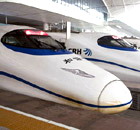Foreign and Military Affairs
China protests over captain's arrest
By Ma Liyao (China Daily)
Updated: 2010-09-09 07:20
 |
Large Medium Small |
BEIJING - The Foreign Ministry on Wednesday lodged a "strong protest" with the Japanese ambassador over the arrest of a Chinese fishing boat captain by Japanese coast guards in waters off China's Diaoyu Islands.
The arrest follows the interception on Tuesday of the Chinese trawler by Japanese patrol boats. The trawler was reportedly involved in two collisions with Japanese patrol boats.
About 40 people gathered outside the Japanese embassy at around 10 am to protest against Japan's so-called law enforcement near the Diaoyu Islands and handed in a letter of complaint. The unofficial China Federation for Defending the Diaoyu Islands organized the protest, according to the Xinhua News Agency.
The protesters, singing China's national anthem and waving national flags, demanded Japan retreat from the islands. They dispersed after 30 minutes.
Japan on Wednesday arrested the captain of the Chinese trawler for "interference with officers on duty" in connection to the reported collisions earlier in the area.
The Japan Coast Guard (JCG) has been holding and questioning the 41-year-old captain, Zhan Qixiong, under custody on the island of Ishigaki in Okinawa prefecture from 6:25 am Wednesday, Japan's Nikkei news agency reported.
The JCG said it would also investigate the vessel, which was set to arrive at Ishigaki later in the day, carrying its 14 Chinese crew who were not arrested but kept on board because they were unable to enter Japan's territory without visas.
The trawler, Minjinyu 5179 registered in Fujian province, was intercepted by the Japanese patrol boats when operating near the Diaoyu Islands. The "two minor collisions" occurred when it was chased by two Japanese patrol vessels earlier on Tuesday. No one was injured.
Wu Tianzhu, the owner of the trawler in Fujian, said it was not the first time that Chinese fishing boats were expelled from their traditional fishing area around the Diaoyu Islands by Japanese patrol vessels.
In June 2008, a Taiwanese fishing boat and a Japanese patrol boat collided about 9 km south of the Diaoyu Islands. The Taiwanese ship sank but all its crew members were rescued.
On Tuesday, Vice-Foreign Minister Song Tao summoned the Japanese ambassador to protest against the interception.
Foreign Ministry spokeswoman Jiang Yu also expressed grave concern over the incident earlier on Tuesday, stressing that the Diaoyu Islands and its adjacent islets have been Chinese territory since ancient times.
In Tokyo, the Chinese embassy also made solemn representations with the Japanese Foreign Ministry over the arrest, demanding the immediate release of the captain and the boat.
Feng Zhaokui, former deputy chief of the Institute of Japan Studies at the Chinese Academy of Social Sciences, said disputes over the Diaoyu Islands were a remnant from recent history following the end of the US occupation of Okinawa in 1972 when the islands were illegally "returned" to Japan. "The US is pleased to see conflicts between China and Japan. But for Japan, a tense relationship with China is not in its interests," Feng said.
China is a promising market for Japan and has been Japan's biggest trading partner since 2009. Bilateral trade reached $138.4 billion in value in the first half of this year, a year-on-year jump of 34.5 percent, according to Japanese statistics.
"Japan is trying to accentuate its control over the islands. But it should see more clearly where its overall interests lie. It should not be obsessed with partial interests," Feng said.
Liu Jiangyong, a senior scholar of Japan studies at Tsinghua University, said he believed that the recent aggressive stance of Japan on the Diaoyu Islands was related to Japanese domestic politics.
Japanese Prime Minister Naoto Kan and Ichiro Ozawa, who is challenging him for the leadership of Japan's ruling party on Sept 14, have both voiced their concern about what they claimed was China's maritime expansion in a television debate Sept 5.
Zhou Wa, Xinhua contributed to this story.











